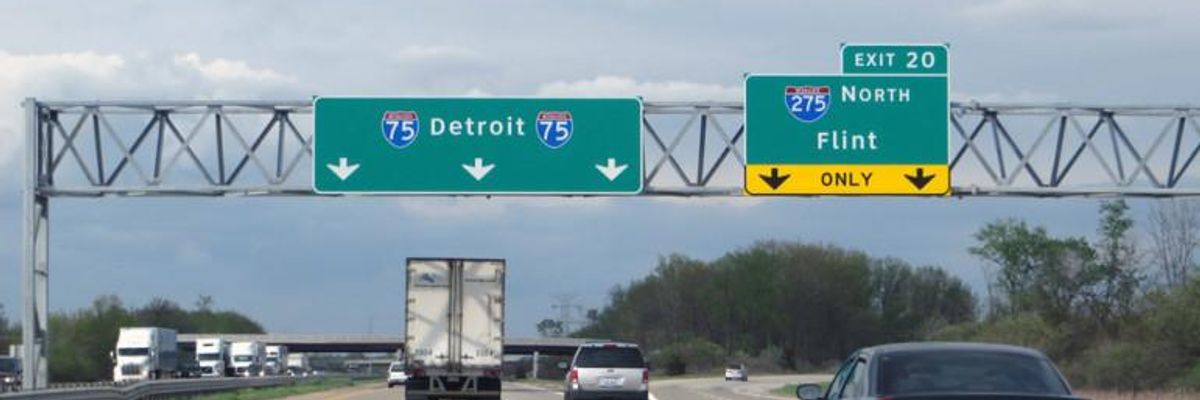A little over a week ago, Michigan Gov. Rick Snyder released hundreds of pages of e-mails related to Flint from 2014 and 2015. One of the attachments, an assessment of Flint's water system by a private water corporation, is very significant.
In February 2015, almost a full year before the news of widespread lead poisoning in Flint, Michigan, gained headlines, the world's largest private water corporation, Veolia, deemed Flint's water safe. They were hired by the city to assess the discolored water that many residents had been complaining about--a General Motors plant had even stopped using Flint's water because it was rusting car parts.
But while Veolia, a French transnational corporation, deemed Flint's water to be "in compliance with State and Federal regulations," they concluded that "aging cast-iron pipe" was creating "aesthetic issues including taste, odor, and discoloration."
Their report didn't mention lead, but they recommended spending $50,000 to add corrosion control chemicals to Flint's drinking water because iron was leaching from the city's pipes.
The city didn't heed Veolia's advice, but regardless, someone should have known that lead was likely leaching into Flint's water as well.
According to Joan Rose, former chairwoman of the U.S. Environmental Protection Agency's drinking water committee, "If you've got iron sloughing off (the pipes), you've got other metals sloughing off, including lead."
Marc Edwards, the Virginia Tech researcher who helped expose the crisis, said that if iron is leaching into the water from old pipes and connections, it follows that lead is also leaching.
Well, it turns out that the Flint City Council--democratically elected by residents--voted overwhelming to return the city's pipes to the old water source just eleven days after Veolia's report. Councilman Eric Mays mentions the report in his testimony before the vote. The council voted to "do all things necessary" to reconnect Flint's pipes and fix the problem.
But the City Council, acting on behalf of the residents they represent, was overruled by Gerald Ambrose, Snyder's "emergency manager" at the time. Ambrose, who had seen the report, called switching back to Detroit's water "incomprehensible" because it would cost money.
This is an indictment of a number of things:
- Gerald Ambrose. For simply doing his job as "emergency manager" to cut costs at the expense of the health and safety of Flint's residents.
- Rick Snyder. Snyder was aware as early as February 1, 2015, that Flint's brown water "may also be attributable to cast iron pipes in customers' service connections to the city lines." He also pushed through the controversial 2012 law allowing "emergency managers" to take over Michigan's cash-strapped municipalities and school boards. The law had been rejected by the state's residents the year before, but Snyder passed it anyway. These managers are, by definition, anti-democratic--they have unchecked authority over local elected officials. Their job description is to cut costs.
- Running government like a business. Snyder is a former corporate executive and venture capitalist with little government experience prior to being governor. Snyder talks about "outcomes" and "deliverables," calls residents "customers," and has sought to "reinvent" Michigan to make it business-friendly.
- Austerity. The tragedy in Flint is a symptom of a larger shift in American political economy. Today, it is normal to blame government deficits for society's problems, and to scoff at raising government revenues (taxes) to fund much-needed investments in critical infrastructure and social programs. The resulting philosophy is: markets good; government spending bad. Which really means: market competition, which favors the already powerful, good; democracy, which has the potential to help everyone, bad.

